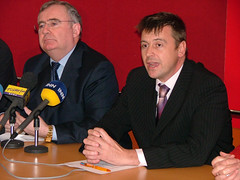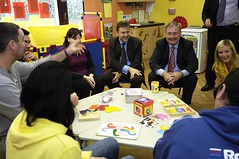Monday, August 18, 2008
Visit to the Mongolian Women Farmers' Association
I spent the morning at home preparing a draft report for my seminar on Thursday on Effective Financial Management of Health Systems. I put it together based on the information I gathered last week coupled with my own knowledge of different systems. I was relatively happy with it by about 1:30pm and then headed into the office.
Namjillmaa met me and we spent the next couple of hours going through the presentation slide by slide. Namjillmaa must now translate each slide into Mongolian, so it's important that she knows and understands exactly what I am saying.
I left the office at 4:15pm and met Ruth from the VSO. We travelled on a Microbus to an outlying Ger district to see one of her projects. For the last year she has been working with the Mongolian Women Farmers Assoicaiton at their Ger farm.
The Ger farm is used to teach local Ger dwellers how to grow vegetables and keep some livestock. It's intention is to make Ger dwellers more self-sufficient in their food needs. Ruth showed me around the project. There are a range of vegetables growing, both indoors and outdoors. All are organic.
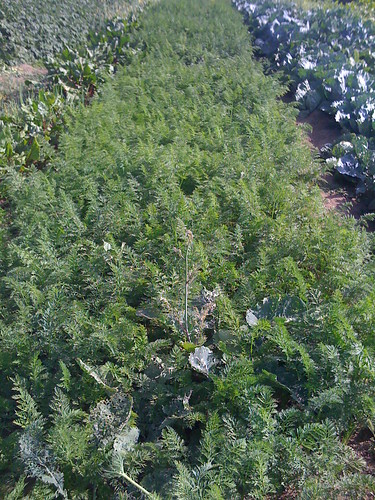
Carrots growing at the Ger farm
Apart from vegetables the farm also raises chickens and rabbits. They teach students about animal husbandry. Whilst chickens are becoming more popular as a food source in Mongolia, they are finding it difficult to encourage people to grow rabbits as a source of meat.
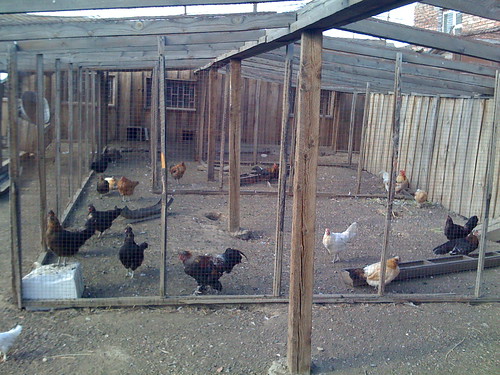
Organic Chickens in the pen
The size of the farm is roughly twice the size of the standard Ger enclosure, but there is still sufficient space available in a standard Ger enclosure to provide more than enough of a family's needs. Since the project has started in 1999 over 4,500 families have learned how to grow their own food.
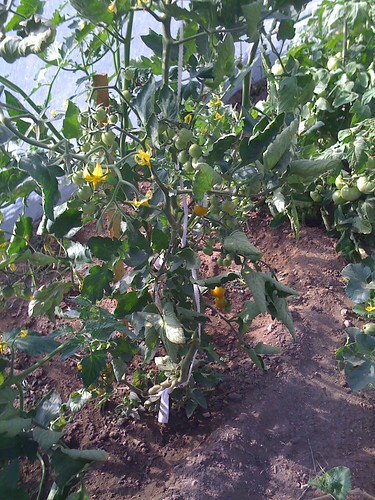
Tomatoes almost ready for picking
You can also stay at the farm for just $5 a night. In return, you get to experience life in a Ger district whilst contributing to an environmentally friendly organisation - you even get to help out with some farming if you want to. Ring them at 976 11 306 187 or on mobile at 99 177 666.
Namjillmaa met me and we spent the next couple of hours going through the presentation slide by slide. Namjillmaa must now translate each slide into Mongolian, so it's important that she knows and understands exactly what I am saying.
I left the office at 4:15pm and met Ruth from the VSO. We travelled on a Microbus to an outlying Ger district to see one of her projects. For the last year she has been working with the Mongolian Women Farmers Assoicaiton at their Ger farm.
The Ger farm is used to teach local Ger dwellers how to grow vegetables and keep some livestock. It's intention is to make Ger dwellers more self-sufficient in their food needs. Ruth showed me around the project. There are a range of vegetables growing, both indoors and outdoors. All are organic.

Carrots growing at the Ger farm
Apart from vegetables the farm also raises chickens and rabbits. They teach students about animal husbandry. Whilst chickens are becoming more popular as a food source in Mongolia, they are finding it difficult to encourage people to grow rabbits as a source of meat.

Organic Chickens in the pen
The size of the farm is roughly twice the size of the standard Ger enclosure, but there is still sufficient space available in a standard Ger enclosure to provide more than enough of a family's needs. Since the project has started in 1999 over 4,500 families have learned how to grow their own food.

Tomatoes almost ready for picking
You can also stay at the farm for just $5 a night. In return, you get to experience life in a Ger district whilst contributing to an environmentally friendly organisation - you even get to help out with some farming if you want to. Ring them at 976 11 306 187 or on mobile at 99 177 666.




